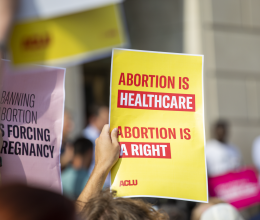Yesterday, the House voted to pass H.R. 7, the No Taxpayer Funding for Abortion Act. On it’s surface, the bill seems like a simple redundancy. The Hyde Amendment makes it illegal to use federal funds for abortion care. This restriction has been solidly in place for over 35 years. There’s been no budging on the Hyde Amendment. In fact, legislative measures are frequently introduced and passed to ensure that the Hyde Amendment can’t be circumvented. This particular Act would make permanent the federal funding restrictions put into place by the Hyde Amendment.
At its best, H.R. 7 reads like redundant and, perhaps, excessive legislation. That’s what the bill’s sponsor, Rep Christopher Smith (R-NJ), would like us to believe. In actuality, H.R. 7 represents an aggressive attack on women’s health care coverage. According to the language of the bill: “None of the funds authorized or appropriated by Federal law, and none of the funds in any trust fund to which funds are authorized or appropriated by Federal law, shall be expended for health benefits coverage that includes coverage of abortion.” Does this seem sweeping to you? Does it seem extreme? Well, it is. This bill is clearly a step towards banning private insurance coverage for specific components of women’s reproductive health care. The bill would levy fines against individuals and small business owners who purchase health insurance plans through the ACA that include coverage for abortion care. Another provision permanently prohibits local government in Washington DC from using local tax revenue to help fund abortion care for low-income women. This particular restriction is unprecedented - states have the authority to fund abortions using their own funds (without interference from the federal government). You can read about the House vote here.
This isn’t the first time we’ve seen this bill. In early 2011, Rep. Smith and Rep. Dan Lipinski (D-IL) introduced the bill as H.R. 3. Public debate about H.R. 3 erupted into a maelstrom when it was revealed that the text of the amendment included language that qualified which “types” of rapes would satisfy the provisions of the Hyde Amendment. If adopted, the Act would exempt women from the Hyde Amendment if the “pregnant female was the subject of an act of forcible rape or, if a minor, an act of incest.” Introducing this new definition of rape sends a frightening message: only certain types of rapes can be deemed “legitimate.” In response to public outcry over this redefinition, Smith quickly agreed to change the strike the word “forcibly” from the text of the bill.
H.R. 7 is unlikely to pass the Senate. House Majority Leader Eric Cantor (R-VA) stated as much when he spoke at the anti-choice March for Life rally last Wednesday. Cantor acknowledged that the push to get the H.R. 7 through the Senate and signed by the president would be difficult. Cantor told the crowd of anti-choice marchers that, in spite of these difficulties, “The people’s House will stand for life.” He vowed that, as House Majority leader, he would schedule a vote on the bill as quickly as possible. His presence at the March for Life rally (as well as the presence of the Rep. Smith, the bill's sponsor) appears to be a move to galvanize the anti-choice base during a crucial election year. It's clear that our representative are playing politics with women's health care access.
In other news, the Fort Worth, Texas hospital has complied with the District Court’s order to remove Marlise Munoz’s body from mechanical support. This news comes as a relief to the Munoz family – they can finally lay their daughter’s body to rest and begin their grieving process. Tests done on the fetus showed that it exhibited physical abnormalities, as well as hydrocephalus and a potential heart problem.






